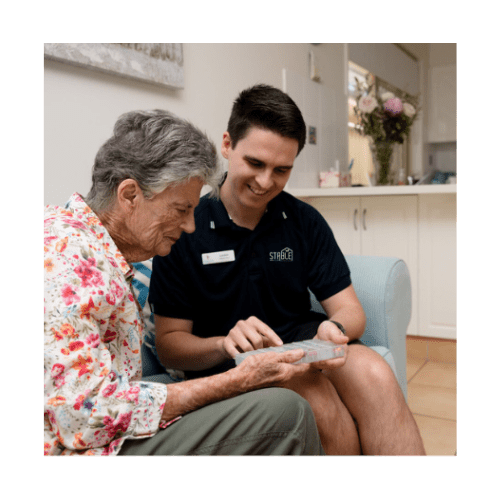Comprehending the Link Between Home Care Providers, In Home Caregivers, and NDIS Support Coordinators
Just How In Home Care Givers Address the One-of-a-kind Challenges and Emotional Demands of Households Looking For Assistance for Their Relatives
In-home caretakers play a crucial duty in navigating the complexities encountered by families looking for assistance for their enjoyed ones. By comprehending one-of-a-kind family members dynamics and providing customized psychological assistance, these professionals not only address immediate treatment needs but also foster an environment of trust fund and open interaction (ndis support coordinator).
Recognizing Family Characteristics
Comprehending household characteristics is vital for offering efficient at home care, as each household operates within a distinct collection of partnerships and interactions. These dynamics include different aspects, including communication designs, functions, and power frameworks that influence exactly how treatment is supplied and obtained. The caretaker must identify these variables to make sure that care strategies align with the household's expectations and worths.
Various households may show unique patterns of interaction, such as collective strategies or ordered structures. For example, in some households, a main decision-maker might hold substantial influence, while in others, choices might be extra democratic. Comprehending these patterns helps caretakers customize their strategies to fit the family members's specific demands.
In addition, social backgrounds play an essential duty in shaping household characteristics. Caretakers should be culturally skilled, acknowledging and valuing varied practices and ideas that may influence treatment preferences.
Ultimately, a thorough understanding of family members dynamics assists in boosted communication, fosters depend on, and improves the caregiver's capability to support the family efficiently. By acknowledging the complex web of obligations and connections, caretakers can develop a supportive environment that advertises well-being for both the individual receiving treatment and the family members in its entirety.
Giving Emotional Assistance
Giving psychological support is an essential component of in-home care that dramatically enhances the wellness of both the individual obtaining treatment and their relative. In the context of caregiving, psychological support involves active listening, compassion, and validation of sensations. Caretakers are educated to identify the emotional battles that households face, such as regret, anxiety, and isolation, and to offer a caring visibility that relieves these worries.
By fostering open interaction, caretakers produce a safe area for relative to reveal their fears and concerns. This dialogue not only urges emotional release yet also reinforces depend on in between the caregiver and the household. Furthermore, caregivers can offer practical techniques to help households handle tension and advertise durability.

Eventually, the emotional support provided by at home caregivers improves the high quality of life for both customers and their family members, advertising an extra caring and understanding caregiving atmosphere. This all natural technique makes sure that psychological requirements are addressed along with physical health considerations.
Taking Care Of Daily Care Tasks
Managing daily care jobs is a vital aspect of in-home treatment that makes sure individuals receive the assistance they need to keep their health and independence. Caretakers play a vital function in assisting with tasks of day-to-day living (ADLs), which include bathing, clothing, brushing, and dish prep work. By tackling these responsibilities, caretakers help relieve the physical and psychological worries that family members may deal with while caring for their liked ones.
Along with individual care, caretakers are additionally charged with medication administration, making certain that clients stick to recommended timetables and does. This oversight is vital for maintaining wellness and avoiding negative results from missed out on or inaccurate drugs. Furthermore, caretakers often assist with wheelchair, offering support for clients moving their homes, thus decreasing the risk of drops and enhancing general safety and security.

Promoting Open Interaction
Effective administration of daily care jobs commonly hinges on the high quality of interaction in between caretakers, customers, and their households. Open communication cultivates an atmosphere where issues, preferences, and responses can be easily traded, making sure that treatment is tailored to meet individual demands. Caregivers should prioritize normal check-ins with both clients and their family members, facilitating conversations that address any problems or changes in care needs.
Making use of different interaction methods-- such as in person meetings, call, and composed updates-- can improve understanding and supply families with comfort. It's essential for caregivers browse around these guys to proactively listen, showing empathy and respect for the psychological landscape of the family. Motivating concerns from family participants can also assist clear up care plans and reinforce the caretaker's commitment to transparency.
Furthermore, keeping open lines of interaction allows caretakers to acknowledge and respond immediately to any kind of changes in a customer's wellness status or psychological wellness. This aggressive method not just reinforces the caregiver-client dynamic but likewise encourages family members to get involved proactively in the care process. Ultimately, fostering open interaction is vital for enhancing the quality of in-home treatment and advertising a supportive ambience for all entailed.
Building Trust Fund and Relationships
Trust fund is the cornerstone of effective at home care, as it establishes a foundation for significant relationships in between caretakers, clients, and their families. Building this trust fund calls for regular, clear communication and an authentic commitment to the wellness of those included. Caretakers should demonstrate dependability with punctuality, adherence to care plans, and responsiveness to the requirements and choices of customers.
To foster trust fund, caregivers must take part in active listening, making certain that families really feel heard and recognized. This includes not just resolving prompt concerns however also anticipating future requirements, thus empowering family members and enhancing their feeling of control. Creating relationship with shared experiences and considerate communications can better solidify these relationships.
Additionally, caretakers need to be educated to acknowledge and attend to the psychological intricacies faced by families. By revealing compassion and concern, they can reduce uncertainties and fears, strengthening trust. Routine updates and check-ins with relative can also improve openness, permitting them to really feel involved and notified concerning their loved one's care.
Eventually, building trust and nurturing relationships in in-home care is a collective process that significantly influences the high quality of treatment offered, cultivating an encouraging environment that benefits everybody involved.
Final Thought
By comprehending family characteristics, providing emotional assistance, and cultivating open interaction, caregivers improve the general caregiving experience - home care providers australia. Their capacity to handle everyday care tasks while constructing depend on and her response strong partnerships grows a supportive setting for customers and their families.
Recognizing family dynamics is essential for supplying effective at home treatment, as each family runs within an unique collection of connections and communications.Giving emotional assistance is an essential part of in-home treatment that considerably improves the wellness of both the individual obtaining treatment and their household participants. By taking on these obligations, caretakers assist alleviate the emotional and physical concerns that families might encounter while caring for their enjoyed ones.
Effective management of everyday treatment jobs frequently hinges on the quality of interaction between caretakers, clients, and their family members - ndis plan manager.Trust fund is the foundation of successful in-home care, as it establishes a foundation for significant relationships between caregivers, customers, and their families